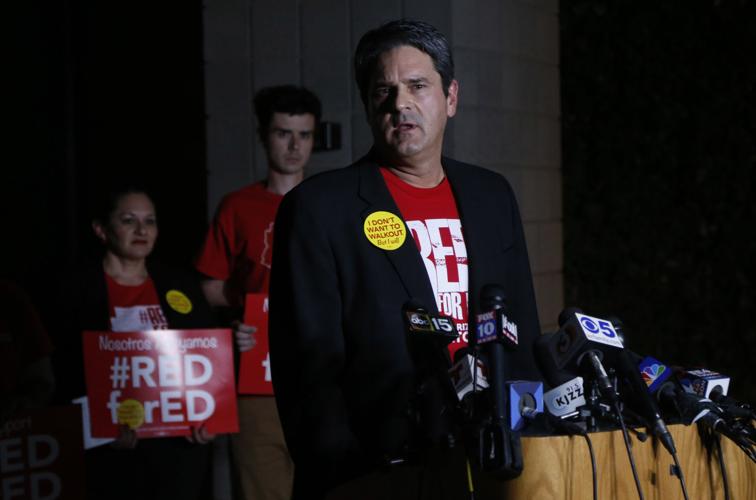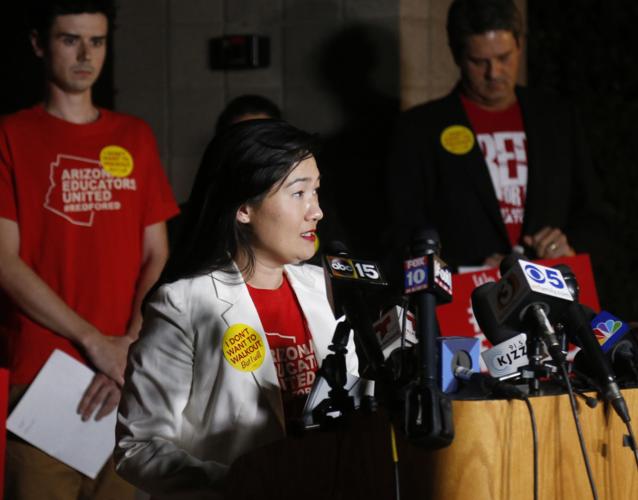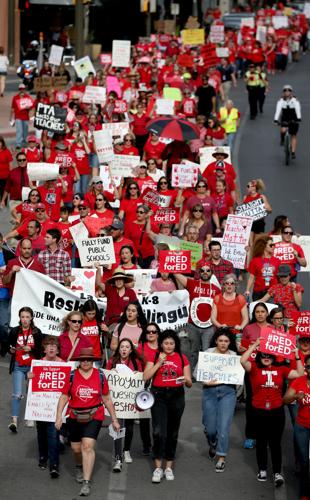PHOENIX — Claiming overwhelming support, leaders of the #RedForEd movement called Thursday night for a strike to start in one week.
Joe Thomas, president of the Arizona Education Association, said 78 percent of more than 57,000 ballots cast statewide during the past three days by teachers and other school employees were in favor of walking out.
"This is undeniably and clearly a mandate for action,'' he said.
Teachers and support staff will remain on the job through Wednesday, said Noah Karvelis, who helped found Arizona Educators United, another group behind #RedForEd.
"We need to give our communities time to prepare,'' he said. They will walk out Thursday, April 26, he said — which would be a unprecedented statewide move in Arizona.
"We can no longer allow the status quo in this state to go unchanged,'' Karvelis said. "We need to bring the change that our educators and our students and our families in this state need.'' Arizona's teachers are among the lowest paid in the nation.
The announcement drew criticism from Gov. Doug Ducey.
"No one wants to see teachers strike,'' the Republican governor said in a prepared statement. "If schools shut down, our kids are the ones who will lose out.''
Ducey repeated his pledge to push to increase salaries by 19 percent over current levels within three years.
The vote is non-binding and does not force anyone to walk out. Neither AEA, a professional organization, nor AEU, a recently formed grass-roots group, is a union with contract bargaining power.
In some ways the tally is not a surprise.
Leaders of both the AEA and the AEU called for the vote, declaring that Ducey's offer falls short.
Part of that is because it fails to include support staffers, from reading specialists to custodians to bus drivers. They also said Ducey rejected their request to oppose new tax cuts until teacher salaries reach the national median, with the governor's offer coming up short of that point.
They also demanded the state restore other funds that have been cut from schools during the past decade as lawmakers enacted tax cuts even during the recession. Ducey's office has acknowledged that state aid on a per-student basis is currently less than it was a decade ago, even before the effects of inflation are considered.
Finally there is the question of whether the money will be there.
Ducey insists that a growing economy will bring in more tax dollars and reduce spending on social services. He also proposes to move money out of other accounts and not fund some agency budget requests.
But legislative budget staffers found what they said are flaws in the governor's number crunching, coming up with their own estimate that the price tag for Ducey's school funding plans would leave the state $265 million in the red by 2020.
That drew a sharp retort from gubernatorial spokesman Daniel Scarpinato, calling those conclusions "based on one faulty analysis that underestimates the amount of revenue growth in the state.'' He said legislative budget staffers are wrong in presuming that the higher annual revenue growth through March was a one-time event and cannot be sustained.
Organizers of the #RedForEd movement did not disclose how many of the votes came from the two major metropolitan areas. There had been talk of opposition from some rural educators concerned about parental backlash.
Karvelis pronounced himself unconcerned given the overwhelming margin of support statewide.
Less clear is how quickly the Republican-led Legislature and the governor could act on the demands — assuming they want to — and where they would get the money.
Thomas said legislators must refuse to enact future tax cuts and rescind some that were granted during the past decade, including a 30 percent cut in corporate income tax rates.
He acknowledged it would take a two-thirds vote of lawmakers either to increase taxes or roll back prior tax cuts. Thomas said lawmakers can come up with that margin if they have the will.
Ultimately, he said, it's not up to educators to come up with a solution. "It's their job to find the money,'' he said.
Karvelis sidestepped questions of how long teachers are prepared to stay out, particularly with the prospect it could keep high school seniors from graduating.
"The worst possible thing we could do is not take action right now,'' he said.
A rejection of Ducey's statement and the call for a strike carries some risks.
Most immediate is that teachers who abandon their posts run the risk of having their contracts terminated and, ultimately, losing their teaching certificates, although superintendents of Tucson Unified and Catalina Foothills districts have already said they won't fire teachers.
There also are lawmakers who have been less than sympathetic with teacher demands for a 20 percent pay increase and who would likely be just as happy to scrap that proposal.
In a floor speech earlier this month, Rep. Anthony Kern, R-Glendale, said the U.S. Bureau of Labor Statistics lists the average salary for all Arizona workers at $48,160. He said average salaries for teachers range from $43,670 for middle school teachers to $44,220 for elementary school and $48,050 for high school teachers.
Kern also pointed out that the legislative decision this year to extend the 0.6-cent sales tax for education beyond 2020 will free up another $64 million a year for salaries, a figure he translated out to about $1,315 per teacher.
"I want those numbers to kind of sink in,'' he told colleagues, saying it will put teacher pay "well above the wage that most Arizonans make in this state.''
Ducey, for his part, said average teacher pay would reach $52,725 by the upcoming school year and $58,130 by 2020 under his proposal.
That, in turn, leads to the possibility that the public support that has empowered the #RedForEd movement could evaporate if voters see the teachers as greedy or ungrateful.
It was that public support that effectively forced Ducey to come up with his offer last week. The budget he proposed in January included just a 1 percent pay raise for teachers.
Ducey has the support of several of the older traditional education groups.
Tim Ogle, executive director of the Arizona School Boards Association, pointed out that the governor's offer was not strictly limited to teacher pay raises.
Earlier this year Ducey committed to restoring $100 million to the "district additional assistance'' fund.
That is the account that schools can use for certain kinds of capital expenditures such as computers, books and school buses. Funding had been eliminated during the recession as lawmakers and governors — including Ducey himself — raided that account to balance the state's books.
Ducey has promised to restore the full $371 million within five years. He has said that schools, which have been using operating funds for those capital needs, would now have more cash for other priorities, including pay raises for support staffs.
But Ducey's offer of capital funds was not entirely voluntary.
Several school districts have filed suit asking a judge to declare the failure to fund that account as illegal.
Teachers' groups say the governor's plan to finance the $670 million cost of the pay raises and the $371 million for those capital needs is not financially sustainable.

Noah Karvelis, Littleton elementary school teacher, talks about the walk-ins next week outside the Arizona Education Association in Phoenix, Ariz. on April 19, 2018. The teachers voted for a walk-out.








